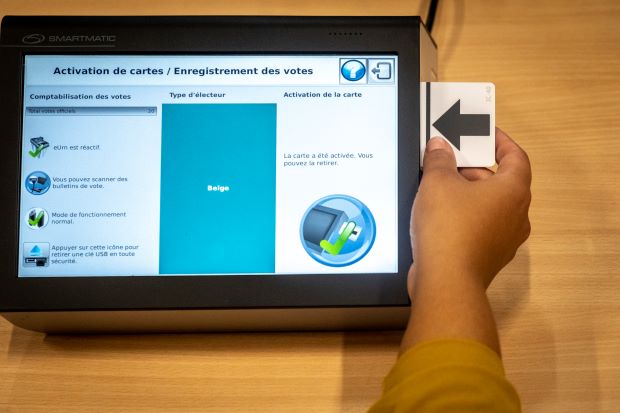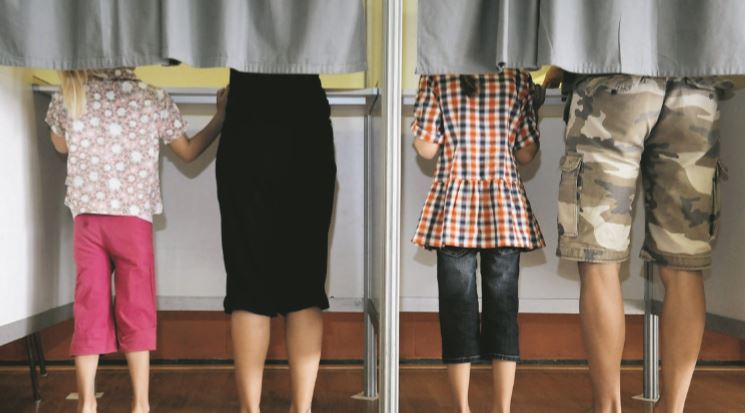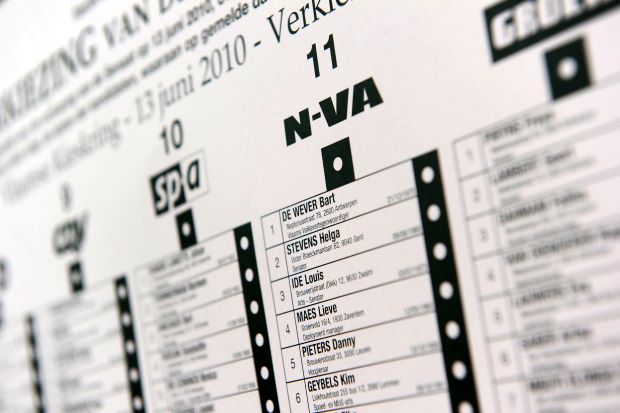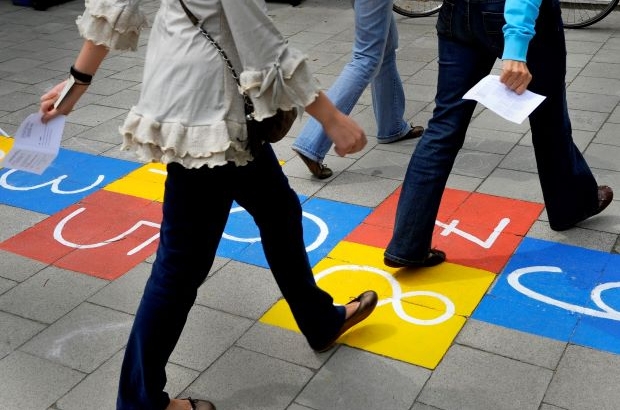- Daily & Weekly newsletters
- Buy & download The Bulletin
- Comment on our articles
Elections 2024: What you need to know before voting on 9 June
Voters in Belgium head to the ballot boxes on 9 June for three separate elections being held across the country.
European, Belgian federal and regional elections all coincide this spring, while municipal and provincial elections are scheduled for 13 October.
In the upcoming election, polling stations everywhere will be open on the Sunday from 8.00 to 14.00. In municipalities where the vote is electronic - all of Brussels and about half of Flanders (though none still in Wallonia) - you can vote for two hours longer, until 16.00.

Who is eligible to vote?
Expats with European citizenship can vote in the European elections and if registered on the electoral list in their commune, in the municipal poll later in the year. Non-EU citizens can take part in the municipal elections but need to have been resident in Belgium for a minimum of five years, have a residency certificate and be registered on the electoral list. See below for details of how to register.
For the federal elections on 9 June, 150 seats (from 11 electoral districts) in the Chamber of Representatives are up for grabs.
Expectations, backed by latest opinion polls, are that the sharp political divide that emerged between the left and right in the last federal elections in 2019 will remain or grow wider still.
On the same day (9 June), people can also vote to elect members to the Flemish Parliament, the Brussels Capital Parliament (89 seats including 72 French speaking and 17 Dutch-speaking), the Walloon Parliament and the Parliament of the German-speaking Community. Only Belgian nationals can vote and only for the region where they reside.

In the voting booth
If your commune uses paper voting, you will receive up to three different pieces of paper. The federal voting slip is white, the regional one is pink and the European one is blue.
Electronic voting is possible in 159 Flemish communes and all the 19 Brussels communes, plus nine in the German Community.
For electronic voting you hand over your polling card and ID to the officer and you will be given a chip card. Take it to one of the booths and insert the card in the machine. Select a language (French or Dutch) and then tap on the electoral list you wish to vote for. You can either tick the top of the list if you are satisfied with how the candidates are ranked, or cast a preferential vote by selecting one or several individual candidates. You can cast a blank vote without being sanctioned (only failing to turn up at all is in in principle an offence).
You then press confirm. A ballot slip is printed out, which should be folded in half and taken to the ballot box. Scan the slip's barcode and post it through the hole.
Paper voting only will take place in 141 Flemish communes and all of the 253 communes in Wallonia.
This year, 830,866 young people will be eligible to vote for the first time, having reached voting age since the last elections took place. For the first time, almost a quarter of a million 16 and 17-year-olds in Belgium can vote, albeit in the European elections only. A social media information campaign is already up and running to help youngsters with the campaign and electoral process.

The mandatory voting system
Belgium is one of the few countries in the world where turning up to vote is mandatory. However, in 2019, one million people (10% of the population and 20% of eligible voters) declined to back anyone on the ballot, either by failing to show up or by casting a blank or invalid vote. These included 6% (438,095) of all votes cast in Wallonia.
It is your attendance - as opposed to actual voting - at elections in Belgium that is compulsory. Failure to turn up to the polling station with a registration letter and ID card renders you liable to a fine of €40 to €80, although such penalties are rarely enforced.
With a veritable glut of federal, regional and European elections, some understandably find it difficult to navigate the system, especially if you don't know which electoral canton or constituency you belong to.
This year, to help you see things more clearly, the RTBF Décrypte team is offering voters an innovative interactive tool
Belgium's major news outlets have also worked together on an 'Electoral Test' interactive quiz which gives an indication of which political party most closely matches your opinions on various topical issues.
The counting of the votes will start as soon as the polls close. No sooner will the 9 June elections be over than campaigning will commence for the next round of elections in the autumn.
Meet the main parties
FLANDERS
Open VLD
A centre-right party, it promotes individual freedoms, entrepreneurship and job creation.
Vooruit
Centre-left grouping, its slogan is “It’s forward or it’s backward. You choose” and fights for investment in education, youth support and healthcare.
Christian Democratic and Flemish (CD&V)
Political group positioned on the centre-right promoting cost of living issues and security.
Groen
Positioned on centre-left, promoting climate-related policies.
New Flemish Alliance (N-VA)
Right-wing, nationalist party fighting for a confederal state. The party is, for the first time, also fielding candidates in the south of the country and says it wants to end Wallonia’s economic ‘dependency’ on Flanders.
Vlaams Belang
Separatist party fighting for strict immigration control and more powers for Flanders.
Belgian Workers Party (PVDA)
A radical left party, it advocates tax justice and action against big polluters.
WALLONIA
Socialist Party (PS)
Political group positioned left of centre, defending social protection.
Mouvement Reformateur (MR)
Centre-right party, defending freedom, the right of the self-employed and businesses as well as national unity.
Ecolo
Political group positioned centre left, it fights for sustainable values and a greener way of life.
Democrate federaliste independent (DeFi)
Previously known as the Democratic Front of Francophones (FDF), it campaigns for the linguistic rights of French-speakers in Brussels.
Les Engagés
Positioned in the centre, promoting a federal Europe and combatting consumption.
Belgian Workers Party (PTB)
The Francophone equivalent of PVDA in Flanders (above).
Smaller parties:
Agora
Standing in the federal elections and in three constituencies only (Brussels, Walloon Brabant and Namur), it wants to “bridge the gap” between elected officials and citizens.
Blanco
Party with the just one policy: to add an additional option to the ballot so electors can also vote for an ‘unallocated’ seat in parliament.
Collectif citoyen
Fielding candidates in the federal elections, Brussels Region and some regional constituencies.
Reprise en main citoyenne
A ‘citizen movement’, this is a new party and promotes press freedom and increased citizen participation in decision-making.
Transparence
Standing in the Brussels Region, it campaigns to allow citizen access to information held by public authorities.
La Gauche anticapitaliste
Campaigns for a reduction in working hours and more investment against gender-based violence. Philippe Poutou, a three-time presidential candidate in France, is on its list.
Lutte Ouvrière
A small, anti-capitalist party best known in France where one of its leading figures, Arlette Laguiller was the first woman to run for the country’s presidency.
L’Unie
A ‘pro-Belgium’ party created by young people in 2023 it fields candidates in Walloon Brabant and Brussels. It advocates a minimum wage of €14 per hour and free SNCB tickets.
La B.U.B. (l’Union belge)
It wants the establishment of a unitary Belgium with a single government and a single parliament, without communities or regions.
Volt
A "pan-European" political party also active in several European countries. It wants a congestion tax and affordable housing.
Plan B
A grouping of citizen movements it seeks a re-distribution of power in Brussels.
Team Fouad Ahidar
A left-leaning party founded by Fouad Ahidar, a Brussels deputy since 2004 and a municipal councillor in Jette.
Viva Palestina
Promotes the Palestinian cause and fielding candidates for the Brussels Region.
Chez Nous
Far-right party created in 2021 which opposes “massive immigration” and “Islamisation”.
Smaller parties are also active in parts of Flanders, including Farmers' party BoerBurgerBelangen (BBB), animal welfare-focused DierAnimal, far-right party Redelijk Rechts, and Voor U, which wants to bring citizens closer to power with slimmed down ministerial cabinets and ‘depoliticised’ administrations and promotes judicial and tax reform.
FACT FILE
Federal Parliament
- 150 seats in Chamber of Representatives
- 76 needed for an absolute majority
Brussels Capital Region
- 89 members in two language groupings (72 French speakers; 17 Flemish)
- Current government comprises PS (16), Ecolo (15), DeFi (10), Groen (3), Vooruit (3) and Open VLD (3)
European Parliament
- Targets an increased turnout compared to just over 50% in 2019
- Belgium elects 22 MEPs, up one from 2019
- This includes 13 from Dutch-speaking areas, eight from the French-speaking and one from the German-speaking area
- A total of 720 seats are up for grabs, down from 751 five years ago
For more information about the ballots you have to fill out in the voting booth, click here for French; here for Dutch. More info about the election process here in French; here in Dutch.
Photos: Dirk Waem/Belga; Hatim Kaghat/Belga; Belga; Belga/Yorick Jansens



















